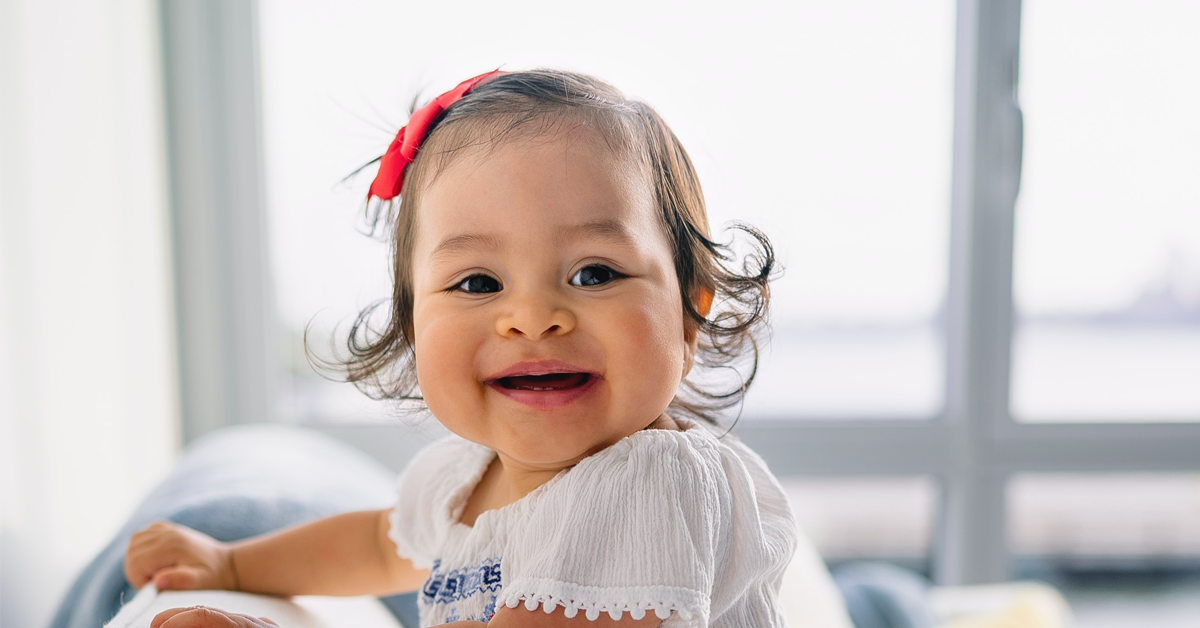
26 Feb 5 Tips to Get Your Child Talking
The first years of life are an explosion of development, and your child is learning about the world around them constantly through all of their senses. These early years (0-5) are critical for speech and language development, but it can be tricky to know what’s typical and what’s not, because there is a range of “normal” development. Below, we provide a summary of the most important developmental language milestones for the first two years of life:
Birth to One Year
What should my child be able to do?
| Hearing and Understanding | Talking |
|---|---|
Birth–3 Months
|
Birth–3 Months
|
4–6 Months
|
4–6 Months
|
7 Months–1 Year
|
7 Months–1 Year
|
One to Two Years
What should my child be able to do?
| Hearing and Understanding | Talking |
|---|---|
|
|
Bottom Line: Most kiddos are saying single words by their first birthday, and should be putting 2-word combinations together by their second birthday.
5 Tips to Foster Language Development
During the early years (0-5), children learn language naturally through their environment, by participating in back-and-forth interactions with the important adults in their lives. Here are 5 simple ways to encourage language development in your little one:
- Spend time face-to-face. It’s important to sit face-to-face with your child at their level when having communicative interactions with them. This encourages eye contact, developing an understanding of facial expressions, and can also aid in learning speech sounds by being able to watch how our articulators (lips, teeth, tongue) move to make sounds. So go ahead, get on the floor and have fun with your kiddo!
- Simplify what you say. It’s important to use sentences with correct grammar as a model for your child, but keep your sentences short. For example, instead of saying, “Let’s go outside and play in the pool because it’s a hot day” you could say, “Let’s go swim. It’s hot!”
- Emphasize key words when talking, to highlight the most important information. You can do this by changing the tone and/or volume of your voice when saying a specific word in a sentence, like, “Careful, it’s hot!”
- Repeat, repeat, repeat. Like many other things in life, we learn by doing through example and repetition. Learning a language is no different! Your child needs to hear new words many times in a variety of contexts to fully grasp their meaning and how to use them. Try and say new words multiple times a day during different activities (e.g., you can highlight the word water during bath time, at lunch, when cooking, and when walking by a pool or pond).
- Let your child lead. The most meaningful learning happens in the moment, when a child is truly interested and fully participating. Instead of pulling your child’s attention away from their interest to teach them about something you think is neat, observe your child and follow their lead. Talk about what they’re doing in that moment, even if it seems simple, like pushing a car up and down a bridge over and over (try “Up, down….up, down. It goes up. It goes down”). All opportunities are valuable opportunities for learning!
When to see an SLP
- The research has shown repeatedly that caregivers are reliable assessors of early childhood development. You should feel confident that you know your child best, and if you have a concern with your child’s language development, you should act quickly. Here are three things you can do if you are concerned:
- Talk to your pediatrician about your concerns and get a referral for an assessment
- Contact your Regional Center to request an assessment
- Contact your local speech-language pathologist
Helpful Links:
- Great article differentiating language delay from late bloomers
- Great article dispelling common myths
- More info on what to do if you are concerned
- Youtube Channel with great tips and fun activities!
Written by: Naguine Bensimon Tree, M.A., CCC-SLP, bilingual certification
References:
Birth to one year. (n.d.). Retrieved February 23, 2021, from https://www.asha.org/public/speech/development/01/
Three keys to helping your child learn language. (n.d.). Retrieved February 23, 2021, from http://www.hanen.org/Helpful-Info/Articles/Three-Keys-to-Helping-Your-Child-Learn-Language.aspx
Squires, J. (2016). Use of parents and caregivers as accurate assessors of young children’s development. Revista Chilena de Pediatría, 88(1), 22-24. doi: 10.4067/S0370-41062017000100002.
